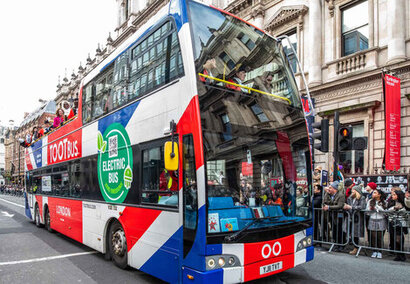
The project will power the existing electric fleet with 100 percent end-to-end renewable power, providing 65,000 kwh of electricity annually or approximately 60,000 kilometres of travel per year once the full fleet has been converted to electric power.
The implementation of the solar panels is expected to take place this summer, with additional infrastructure projects in the pipeline to support Tootbus’ plans to operate London’s first fully electric sightseeing bus fleet by 2029.
“We are thrilled to have secured approval for these solar panels” said Gavin Brooking, Managing Director at Tootbus UK. “Sustainability has been central to our operations since the launch of Tootbus, and this project is a hugely exciting step in our renewable energy journey. We are pleased to continue to be well ahead of policy priorities and see it as our imperative to lead. Green tourism is vital to keeping central areas of London clean, safe and pollution-free, and we are proud to be at the forefront of this movement. Electric vehicles have a vital role to play in supporting emission reduction efforts across the transport sector, which is responsible for the majority of air pollutants. Tootbus has led the industry in decarbonising efforts to date, helping to minimise the environmental burden on the cities in which we operate. We are also encouraged that our efforts were recently recognised through our ISO Certification for Environmental Responsibility.”
Tootbus is a leading operator of hop-on hop-off sightseeing bus tours in London, Bath, Paris & Brussels. The company is a market leader in sustainability, having first converted to HVO fuel in 2021, which can reduce CO2 emissions by up to 90 percent. Most recently, its London operations partnered with VEV to power its existing electric vehicles and to help deliver its fleet electrification plan by 2029, with two more HVO-fuelled buses set to be converted to electric power this year.
The approval for new solar panels represents the first significant milestone in this partnership and means that Tootbus London can reduce the need for fossil fuel usage in its electricity generation. The company has also taken steps to deliver a paperless ticketing system via its Tootbus app and uses sustainably sourced customer equipment, including wheat straw fibre headphones that customers are encouraged to take home and reuse.
Customers choosing to buy from Tootbus London will be making a conscious decision to lower their carbon footprint and enjoy a range of immediate benefits from its electric vehicle operation, including fresher air, smoother journeys, and reduced noise – meaning that they can experience the city to its fullest extent and enjoy the sights in their intended setting.
As Tootbus London continues to convert its fleet to electric power, the general public in the busiest areas of central London will stand to benefit from reduced greenhouse gas emissions and minimised noise pollution, and a reduced impact on the shared National Grid.
“We're delighted to be partnering with Tootbus on their journey towards a fully electrified and sustainable fleet” added Mike Nakrani, CEO of VEV. “Solar power generation was an integral part of the electrification strategy we developed together. With careful charging scheduling, Tootbus can now maximise the utilisation of clean solar energy when the sun is shining, reducing its reliance on the grid during those times. As their end-to-end solutions provider, VEV took responsibility for navigating the complexities of gaining planning permission for the solar installation. In this instance the Tootbus Wandsworth depot being a Grade 2 listed building added an extra layer of complexity that we were successfully able to overcome. This project is a significant milestone and paves the way for Tootbus to realise their ambition of operating London's first fully electric, renewable-energy powered sightseeing fleet by 2029 while substantially reducing emissions and minimising their environmental impact.”
For additional information:

